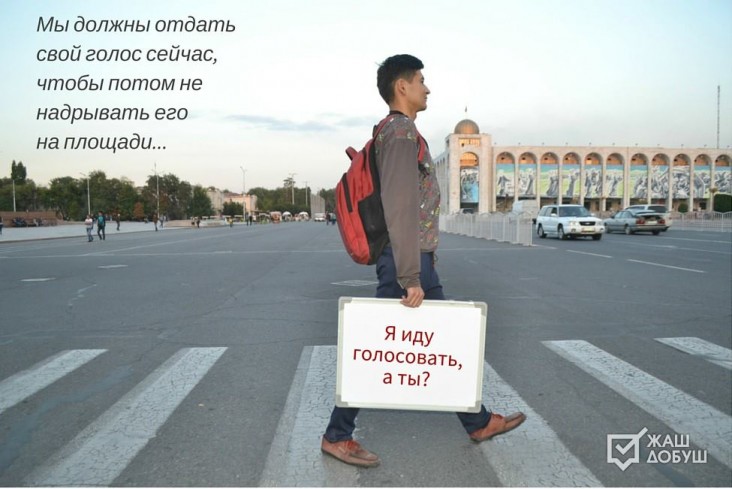Speeches Shim

January 2016—While youth political participation in Kyrgyzstan has been historically low, Kyrgyz youth are active on social media, often accessing it via mobile networks that cover most of the country. Could a campaign to turn online activity into real-life activity at the polling stations make a difference in voter turnout?
“Yes, I have only one vote, but there are thousands of people like me. And if we all come together, every vote will be important and count when summing up the results,” says Jyldyz Suranalieva in her Facebook post.
Her post reflects the message of a massive social media campaign led by the National Democratic Institute (NDI) in September to get Kyrgyz youth to vote in the recent parliamentary elections. As part of the campaign, NDI also organized a contest for the best social media post in partnership with Azattyk Media, the Kyrgyz service of Radio Free Europe/Radio Liberty.
This Get-Out-the-Vote campaign targeted at youth was carried out under USAID's Kyrgyzstan Political Processes Program, which was designed to increase participation of underrepresented groups in the political process.
The contest submissions included videos, photos and texts that explained why voting is important. NDI also produced a number of videos targeted at young voters and sent messages to mobile phones reminding people to vote. In one month, more than half a million residents of Kyrgyzstan viewed, commented, shared and “liked” these posts, further disseminating the get-out-and-vote messages.
Dastan Niazov, the winner of the photo contest, took a photo of himself in Ala Too central square, a popular mass protest area in Bishkek, Kyrgyzstan’s capital city, and posted it with a message: “We have to make our voices heard now so that we don’t have to lose our voices on the square. I am going to vote, and you?” The picture was “liked” by more than 1,000 of Dastan’s peers.
Humor and informal language typical for online communication were key factors for successful engagement of young viewers. They turned videos about “boring” elections into something that young people actually liked and shared with their friends. Videos generated by users as well as those produced by NDI were viewed more than 150,000 times, an impressive number considering that there are about 168,000 Facebook users registered in Kyrgyzstan.
The campaign’s website also offered relevant information about the elections, including 12 reasons to vote as well as a Q&A section.
To supplement online activity, NDI worked with dozens of youth activists to spark interest in the elections. The activists met with their peers, many of whom would be first-time voters, at university campuses to talk about the importance of voting and explaining the electoral procedures. The latter was especially critical because these were the first Kyrgyz elections that used fingerprint scanning for voter identification to counter fraud.
At the elections on Oct. 4, 2015, young voter turnout was higher than in previous elections, contributing to a 2.5 percent increase in overall turnout compared to the 2010 parliamentary elections.
The Political Processes Program, which ran from 2012 to 2015, worked to build democracy in Kyrgyzstan by strengthening the responsiveness and sustainability of political institutions—specifically, the political parties and Parliament—as well as civil society organizations.
LINKS

Comment
Make a general inquiry or suggest an improvement.